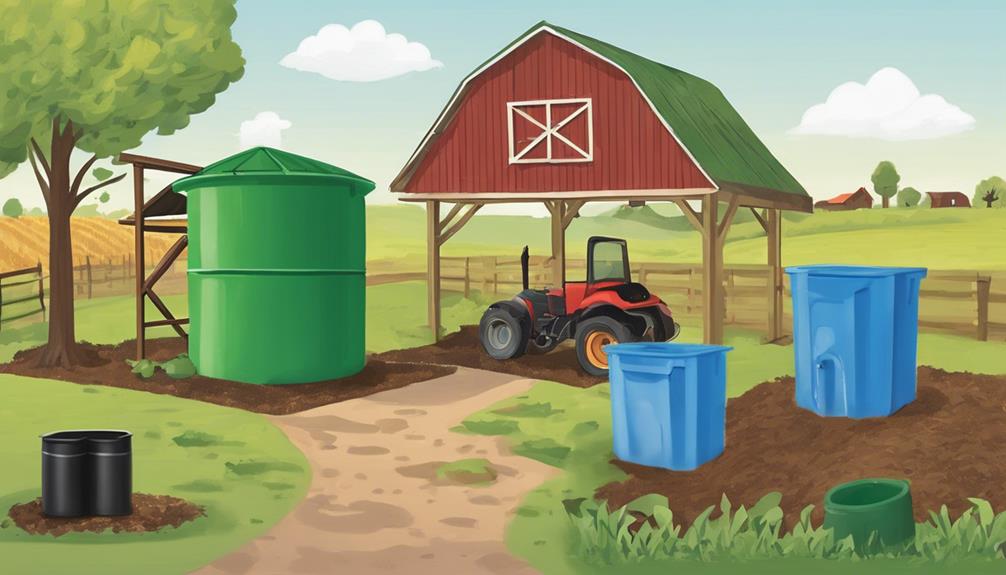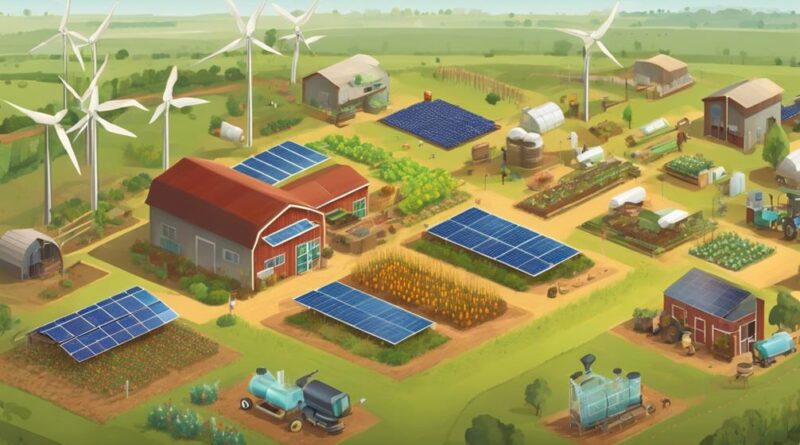Implementing Sustainable Practices in Eco-friendly Agriculture
Incorporate sustainable methods into eco-friendly agriculture by focusing on soil health, water conservation, biodiversity, pest management, composting, solar power, waste reduction, and carbon footprint reduction. Prioritize soil testing, cover cropping, rainwater harvesting, and integrating natural pest controls. Enhance biodiversity with native species and habitat restoration. Implement composting techniques and solar power usage for efficient resource utilization. Embrace waste reduction initiatives and minimize carbon footprint through renewable energy and emission reduction practices. Start your journey towards sustainable agriculture with these eco-friendly strategies.
Soil Health Maintenance
To maintain optimal soil health in eco-friendly agriculture, it's essential to regularly test and amend the soil based on its specific nutrient needs. Nutrient recycling plays a crucial role in this process. By utilizing organic materials such as compost or manure, you can replenish essential nutrients in the soil, reducing the need for synthetic fertilizers. This practice not only enhances soil fertility but also minimizes environmental pollution.
Cover cropping is another key strategy for soil health maintenance. Planting cover crops during fallow periods helps prevent soil erosion, suppresses weeds, and improves soil structure. Legumes, such as clover or vetch, can fix nitrogen from the air, enriching the soil without the need for additional inputs. When these cover crops are later incorporated into the soil, they contribute organic matter, promoting microbial activity and enhancing nutrient availability for subsequent crops.
Innovative techniques like precision agriculture can aid in optimizing nutrient management. By using technology to analyze soil variability within fields, you can apply fertilizers more efficiently, targeting specific areas with tailored nutrient applications. This not only reduces waste but also improves crop yields while minimizing environmental impact.
Water Conservation Methods
Maintaining optimal soil health through nutrient recycling and cover cropping sets the foundation for implementing efficient water conservation methods in eco-friendly agriculture. To further enhance your water conservation efforts, consider integrating rainwater harvesting and drip irrigation techniques into your farming practices.
Rainwater harvesting involves collecting and storing rainwater for later use. By setting up systems to capture rainwater from rooftops or other surfaces, you can utilize this natural resource for irrigation purposes. This method not only reduces the demand on traditional water sources but also helps in preventing soil erosion and runoff.
Drip irrigation techniques deliver water directly to the roots of plants in a slow and steady manner. This targeted approach minimizes water wastage through evaporation or runoff, ensuring that your crops receive just the right amount of moisture they need to thrive. Additionally, drip irrigation systems can be combined with fertilization methods, promoting efficient nutrient uptake by the plants.
Incorporating these water conservation methods into your eco-friendly agriculture practices not only benefits the environment but also contributes to the overall sustainability of your farm. By maximizing the use of natural resources like rainwater and adopting precision irrigation techniques, you can effectively manage water resources while promoting the health and productivity of your crops.
Biodiversity Promotion
Enhancing biodiversity within your agricultural practices can significantly boost ecosystem resilience and productivity. By focusing on habitat restoration and native species reintroduction, you can create a more balanced and sustainable environment. Habitats play a crucial role in supporting various species, and restoring them can help in preserving the natural balance within ecosystems. Reintroducing native species that have been displaced can enhance biodiversity and promote a healthier ecosystem overall.
Moreover, protecting pollinators is essential for crop production. Pollinators such as bees and butterflies play a vital role in the pollination of many crops. Implementing practices that support pollinators, like planting diverse flowering plants and avoiding pesticide use during blooming periods, can help maintain healthy pollinator populations. Additionally, crop diversification is key to promoting biodiversity within agricultural systems. Growing a variety of crops helps create diverse habitats, reduces the risk of pests and diseases, and enhances soil health.
Incorporating these strategies into your agricultural practices not only benefits the environment but also contributes to the long-term sustainability of your farm. By prioritizing biodiversity promotion through habitat restoration, native species reintroduction, pollinator protection, and crop diversification, you can create a more resilient and productive agricultural system.
Integrated Pest Management
Implementing an integrated pest management approach maximizes crop protection while minimizing environmental impact in eco-friendly agriculture. By utilizing natural predators and organic pesticides, you can effectively control pest populations without relying on harmful chemicals. Natural predators such as ladybugs, lacewings, and predatory mites can be introduced to your crops to feed on common pests like aphids, mites, and caterpillars. This method not only targets specific pests but also helps maintain a balanced ecosystem within your farm.
Organic pesticides derived from natural sources like neem oil, diatomaceous earth, and garlic spray offer a safe alternative to synthetic chemicals. These pesticides break down quickly in the environment, reducing the risk of harmful residues in the soil and water sources. When used in conjunction with other pest management strategies like crop rotation and maintaining proper plant health, organic pesticides can effectively manage pest populations while promoting overall sustainability.
Integrated pest management requires careful monitoring of pest populations and implementing appropriate control measures at the right time. By combining the use of natural predators and organic pesticides, you can create a holistic approach to pest control that's both effective and environmentally friendly. Embracing these sustainable practices not only protects your crops but also contributes to the long-term health of your farm and surrounding ecosystem.
Composting Techniques
To further optimize your eco-friendly agricultural practices, exploring efficient composting techniques can significantly enhance soil health and nutrient availability for your crops. Composting is a valuable method for nutrient recycling and organic decomposition in sustainable agriculture. By decomposing organic materials such as kitchen scraps, yard waste, and manure, you create nutrient-rich compost that improves soil structure, enhances water retention, and promotes beneficial microorganisms' growth.
One innovative composting technique is vermicomposting, which utilizes worms to break down organic matter into nutrient-rich castings. This method accelerates the decomposition process and produces high-quality compost that's rich in essential nutrients for plant growth. Additionally, aerobic composting, which involves turning the compost pile regularly to ensure proper aeration, speeds up decomposition and helps prevent odors.
When composting, it's essential to maintain the right balance of green (nitrogen-rich) and brown (carbon-rich) materials to facilitate the decomposition process effectively. Green materials, such as food scraps and grass clippings, provide nitrogen, while brown materials like dry leaves and straw supply carbon. Mixing these materials in the correct ratios creates a balanced environment for microorganisms to thrive and break down the organic matter efficiently.
Incorporating these composting techniques into your eco-friendly agricultural practices won't only improve soil fertility but also reduce the need for chemical fertilizers, ultimately promoting a more sustainable and environmentally friendly approach to farming.
Energy Efficiency Strategies
Energy efficiency strategies play a crucial role in optimizing resource utilization and reducing environmental impact in eco-friendly agriculture. Implementing solar power utilization can significantly decrease reliance on traditional energy sources, cutting costs and lowering carbon footprints. By harnessing the sun's energy through solar panels, farms can power various operations sustainably. Pairing solar power with smart irrigation systems enhances efficiency further, ensuring water is used judiciously based on real-time data and plant needs.
Moreover, integrating renewable energy sources such as wind or hydroelectric power diversifies the energy mix, making farms less susceptible to price fluctuations in the energy market. This shift towards renewable energy not only benefits the environment but also contributes to long-term cost savings for farmers. Efficient lighting solutions, like LED bulbs, offer another avenue for energy conservation. LED lights consume less electricity and have a longer lifespan, making them a practical choice for illuminating agricultural spaces during late hours.
Waste Reduction Initiatives

You can enhance sustainability and efficiency in eco-friendly agriculture by focusing on waste reduction initiatives. Implementing recycling programs and conducting waste audits are essential steps in identifying areas where waste can be minimized. By analyzing the waste generated in your agricultural practices, you can pinpoint opportunities for improvement and implement targeted solutions.
Upcycling initiatives play a crucial role in waste reduction. Instead of disposing of materials that may seem unusable, consider ways to repurpose or transform them into valuable resources. Embracing the principles of a circular economy, where resources are reused and regenerated, can significantly reduce waste in agriculture. For example, organic waste from crops or livestock can be composted and used to enrich soil health, closing the loop on nutrient cycles.
By actively participating in recycling programs, you contribute to the sustainable management of resources. Recycling materials like plastic containers, metal tools, or paper packaging can help reduce the environmental impact of agricultural operations. Additionally, supporting initiatives that promote the circular economy not only minimizes waste but also fosters a more resilient and resource-efficient agricultural system.
Incorporating waste reduction initiatives into your eco-friendly agriculture practices is a proactive step towards a more sustainable future. By embracing recycling, upcycling, and the principles of a circular economy, you can minimize waste generation, conserve resources, and contribute to a healthier environment for future generations.
Carbon Footprint Minimization
Minimizing the carbon footprint in eco-friendly agriculture requires strategic planning and implementation of sustainable practices. One effective way to reduce carbon emissions in agriculture is by incorporating renewable energy sources. By utilizing solar panels, wind turbines, or bioenergy from organic waste, farms can significantly decrease their reliance on fossil fuels and cut down on greenhouse gas emissions.
Another key aspect of carbon footprint minimization is focusing on emission reduction strategies. This can involve optimizing fertilizer use to prevent nitrogen runoff, which contributes to greenhouse gas emissions. Implementing precision agriculture techniques, such as using GPS-guided tractors and drones for targeted pesticide application, can help minimize emissions by reducing fuel consumption and chemical usage.
Furthermore, promoting agroforestry practices can play a crucial role in sequestering carbon dioxide from the atmosphere. Planting trees alongside crops not only enhances biodiversity and soil health but also helps offset carbon emissions through carbon sequestration.
Conclusion
In conclusion, implementing sustainable practices in eco-friendly agriculture is crucial for preserving our environment and ensuring long-term food security.
By focusing on soil health maintenance, water conservation methods, biodiversity promotion, integrated pest management, composting techniques, energy efficiency strategies, waste reduction initiatives, and minimizing carbon footprints, we can create a more resilient and environmentally friendly agricultural system.
It's imperative that farmers and policymakers prioritize these practices to address the challenges of a changing climate and growing population.
